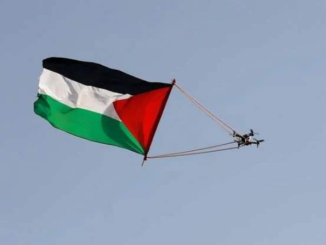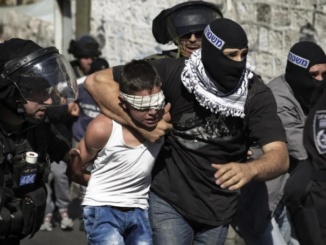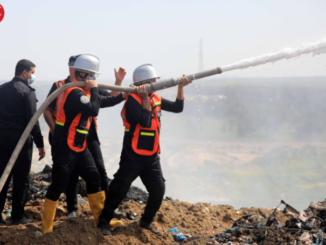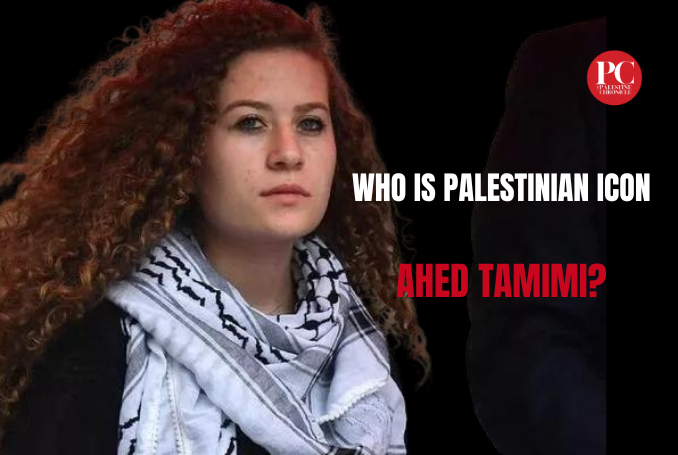
The story of Ahed Tamimi has come to embody, in many ways, the wider Palestinian experience under Israeli occupation.
A daughter of Nabi Saleh, a Palestinian village cut off from the rest of the West Bank by a military barrier and an illegal Israeli settlement, Ahed Tamimi rose to become an icon of her people’s struggle.
Taken into military detention for the second time in early November, her release under the recent prisoner exchange between the Palestinian Resistance and Israel has placed a spotlight on Tel Aviv’s state-sponsored systematic torture and abuse of female inmates in Israeli prisons.
Ahed Tamimi, who rose to global prominence after a video of her trying to slap an Israeli soldier went viral in 2017 is on a list of Palestinian prisoners who could be freed.
She Has spent 8 months in jail.
She is vocal on Social media.#israel #Gaza #GazaGenocide #Palestine pic.twitter.com/RNopNpI9WN
— Aditya Rathore (@imAdityaRathore) November 28, 2023
From her early years as a small child, Ahed Tamimi was propelled into the spotlight for her tremendous bravery in facing off against armed Israeli soldiers who had raided her village.
In 2012, at the age of 11-years-old, she was filmed and photographed standing up to Israeli soldiers, holding up her fist and screaming at them, as her older brother was being arrested.
Just months earlier, Ahed’s mother had also been detained by armed soldiers, which added to prompting the famous outburst at the occupation soldiers that had again stormed Nabi Saleh.
Daughter of the well-known activist, Bassem Tamimi, the young Ahed was no stranger to non-violent protests against the illegal settlement that had been set up on the territory of her village.
Palestinian Activist Ahed Tamimi: We Should Always Slap Israeli Soldiers Whether They Did Anything or Not pic.twitter.com/sT6rQwA6Az
— MEMRI (@MEMRIReports) October 25, 2018
Although her face and name were known, it was not until December of 2017 that she would truly gain the spotlight, as the then 17-year-old would be viewed as the teenage heroine who stood up to the Israeli occupying forces, this time slapping an armed soldier in the face.
The video of her famous slap went viral, prompting a backlash from within Israeli society, which led to mass calls for her arrest and even abuse. The cries for “revenge” against Ahed, that had come from the Israeli public, encouraged the Israeli military to act.
Ahed was sentenced to eight months in Israeli military prison for her actions against the soldiers who had invaded her village and home, one of whom had just shot her 15-year-old cousin, Mohammed Tamimi, in the head during a protest that same day.
Mohammed miraculously managed to survive, after having temporarily entered a medically induced coma; during which doctors had made the decision to remove part of his skull.
The IDF arrested 10 Palestinians in an overnight raid on Nabi Saleh. One of them was Ahed Tamimi's cousin, Mohammed, whose skull was shattered by a rubber bullet back in December, and is awaiting surgery. Now he's in Israeli custody. A light unto the nations indeed. pic.twitter.com/PD26uu1Kxw
— Edo Konrad (@edokonrad) February 26, 2018
The arrest of a young girl, under the age of 18, was nothing new for the Israeli army, but the video of Ahed confronting the soldiers and humiliating one of them, was. This, combined with her light skin, blond hair and blue eyes was attributed to her case having garnered such massive attention from the international media.
Ahed Tamimi, now 22 years old, had again been arrested by Israel and has been held in administrative detention (held without charge nor trial), since early November.
Upon her release from Israeli military prison, coming as a result of the prisoner-exchange deal that was struck between the Palestinian Resistance movement Hamas and the Israeli government, Ahed spoke of the daily abuse that the hundreds of Palestinian women held in Israeli detention were facing.
Appearing to have been in a state of emotional distress, she spoke to local Palestinian media of female detainees being forced to sleep on the floor, while enduring frequent humiliation and abuse, even torture, at the hands of their jailers.
BREAKING : Ahed Tamimi, just released from Israeli occupation jail, speaks about the horrific conditions in Israeli dungeons:
“No food, no water, no clothes. We slept on the floor. They threatened to kill my father who is languishing in Israeli prison.” pic.twitter.com/YASneYGp4l
— sarah (@sahouraxo) November 30, 2023
The story of Ahed Tamimi has come to embody, in many ways, the wider Palestinian experience under Israeli occupation.
This is why she became so popular amongst Palestinians and Palestine supporters globally. In Ahed, people were exposed to the robbery of innocence from a childhood, the steadfastness of the Palestinian youth in the face of persecution, along with the battle of the oppressed against armed settlers and an occupying army.
Through slapping an Israeli soldier, Ahed Tamimi sent the message to the world that the Palestinian people were not going to sit back and allow their suffering to go unanswered, even if the only way of fighting back was through a symbolic act of defiance.
(The Palestine Chronicle)
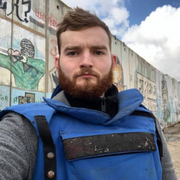
– Robert Inlakesh is a journalist, writer, and documentary filmmaker. He focuses on the Middle East, specializing in Palestine. He contributed this article to The Palestine Chronicle.



